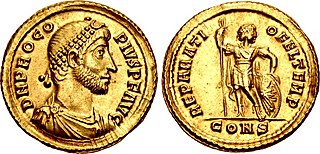Related Research Articles

Procopius was a Roman usurper against Valens.

Flavia Maximiana Theodora was a Roman empress as the wife of Constantius Chlorus.

Flavius Claudius Constantius Gallus was a statesman and ruler in the eastern provinces of the Roman Empire from 351 to 354, as Caesar under emperor Constantius II, his cousin. A grandson of emperor Constantius Chlorus and empress Flavia Maximiana Theodora, and a son of Julius Constantius and Galla, he belonged to the Constantinian dynasty. Born during the reign of his uncle Constantine the Great, he was among the few male members of the imperial family to survive the purge that followed Constantine's death. Under Constantius II, Gallus served as deputy emperor, based in Antioch and married to Constantius' sister Constantina. He dealt with a Jewish revolt in the years 351-352. Gallus ultimately fell out of favor with Constantius and was executed, being replaced as Caesar by his younger half-brother Julian.
Flavius Julius Constantius was a member of the Constantinian dynasty, being a son of Emperor Constantius Chlorus and his wife Flavia Maximiana Theodora, a younger half-brother of Emperor Constantine the Great and the father of Emperor Julian.

Eutropia was a Roman empress of Syrian origin, the wife of Emperor Maximian.

Flavia Julia Constantia was a Roman empress as the wife of Licinius. She was the daughter of the Roman emperor Constantius Chlorus and his wife Flavia Maximiana Theodora, and younger half-sister of Constantine the Great.
Justina was a Roman empress. She was initially the wife of the rebel emperor Magnentius and was then married to Valentinian I, with whom she had four children, including the emperor Valentinian II and the empress Galla.

Minervina was either the first wife or a concubine of Constantine I, and the mother of his eldest son Crispus.

Flavia Valeria Constantina, later known as Saint Constance, was the eldest daughter of Roman emperor Constantine the Great and his second wife Fausta, daughter of Emperor Maximian. Constantina may have received the title of Augusta from her father, and is venerated as a saint, having developed a medieval legend wildly at variance with what is known of her actual character.

Gaius or Lucius Fulvius Plautianus was a member of the Roman gens Fulvia. As head of the Praetorian Guard, he was very influential in the administration of state affairs, and clashed with Julia Domna, the wife of Septimius Severus.
Barbatio was a Roman general of the infantry under the command of Constantius II. Previously he was a commander of the household troops under Gallus Caesar, but he arrested Gallus under the instruction of Constantius, thereby ensuring his promotion on the death of Claudius Silvanus. In 359, both he and his wife Assyria were arrested and beheaded for treason against Constantius, possibly as part of a plot by Arbitio, a senior cavalry commander, and another exponent of the forms of scheming and political intrigue that became such a part of the later Roman Empire.

Constantia (362–383) was the first empress consort of Gratian of the Western Roman Empire. According to Ammianus Marcellinus, her mother was Faustina and her father was Constantius II, who died before Constantia was born.

Licinius II, also called Licinius Junior or Licinius Caesar, was the son of the Roman emperor Licinius I. He held the imperial rank of caesar between March 317 and September 324, while his father was augustus, and he was twice Roman consul. After losing a civil war, his father lost power and both he and Licinius Junior were eventually put to death.
A daughter of Julius Constantius, of unknown name, was the first wife of Constantius II.
Valerius Maximus was a Roman senator.

NeratiusCerealis was a Roman senator and politician, Praefectus urbi and Consul.
Vulcacius Rufinus was a Roman politician, related to the Constantinian dynasty.
Basilina was the wife of Julius Constantius and the mother of the Roman emperor Julian who in her honour gave the name Basilinopolis to a city in Bithynia.
The gens Neratia or Naeratia was a plebeian family at ancient Rome, some of whom subsequently became patricians. The first of the gens to appear in history occur in the time of Augustus, but they did not rise to prominence until the time of Vespasian, when Marcus Neratius Pansa became the first to obtain the consulship. The Neratii married into the Roman imperial family in the fourth century.
Memmius Vitrasius OrfitussignoHonorius was a Roman politician.
References
- ↑ Jones, Martindale & Morris, p. 226.
- ↑ Probably Neratius was her brother and Vulcacius her half-brother, as "Gallus" is a cognomen of the Neratii (Jones, p. 198).
- ↑ Julian, Letter to the Athenians, 270D.
- ↑ Noel Emmanuel Lenski, The Cambridge companion to the Age of Constantine, Volume 13, Cambridge University Press, 2006, ISBN 0-521-52157-2, p. 107.
- ↑ Libanius xviii.10.
- ↑ Lenski, p. 97.
- ↑ Banchich, Thomas M., "Gallus Caesar (15 March 351 – 354 A.D.)", DIR (1997)